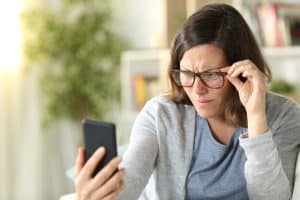
Blue Light Sources
Blue light is part of the light spectrum and has the shortest wavelength and highest energy. Exposure to blue light can come from a number of artificial sources in addition to the sun. These include:
- Fluorescent lighting
- LED light
- Smartphones
- Tablets
- Laptops
- Computer monitors
Although exposure to blue light from devices such as smartphones is low compared to exposure to blue light from the sun, the extended time spent looking at these screens as well as their proximity to our eyes raises concerns over the long-term impact.
Impact on the Eyes
Blue light passes through the eye and hits the retina, but over-exposure to this light can age the eyes prematurely and cause other issues, such as:
Eyestrain: Also known as computer vision syndrome, digital eyestrain is a group of vision-related issues that arise from extended time spent using a device with a digital screen. Computer screens vary in contrast, flicker, and refresh rate, making the eyes work harder which leads to symptoms like double vision, blurred vision, and dry eyes.
Damage to the retina: Continued exposure to blue light could lead to damaged retinal cells over time, which may cause vision issues such as age-related macular degeneration.
Protecting Your Eyes from Blue Light
There are a few things you can do to protect your eyes from constant blue light exposure:
Reduce screen time: Our lives are largely reliant upon our access to and use of digital devices to work, communicate, and travel, among other things. As such, reducing screen time can seem like an impossible feat, but it can be done, especially if it contributes to the health of the eyes. Try using your device for shorter increments of time. Additionally, turning off your phone or digital devices before bedtime can help your eyes get a healthy break from blue light.
Blue light filters: Blue light filters may be a feature on some smartphones, helping to reduce your overall exposure. These filters reduce the amount of blue light emitted.
Treated lenses: Certain lenses, such as anti-reflective lenses and computer glasses, can reduce glare and lessen eyestrain from digital screens while blocking blue light that can reach the retina.
Schedule a Consultation
If constant blue light exposure is making your eyes feel bad, it may be time to visit Mark Mandel, MD. To schedule a consultation, contact our office or book an appointment online.